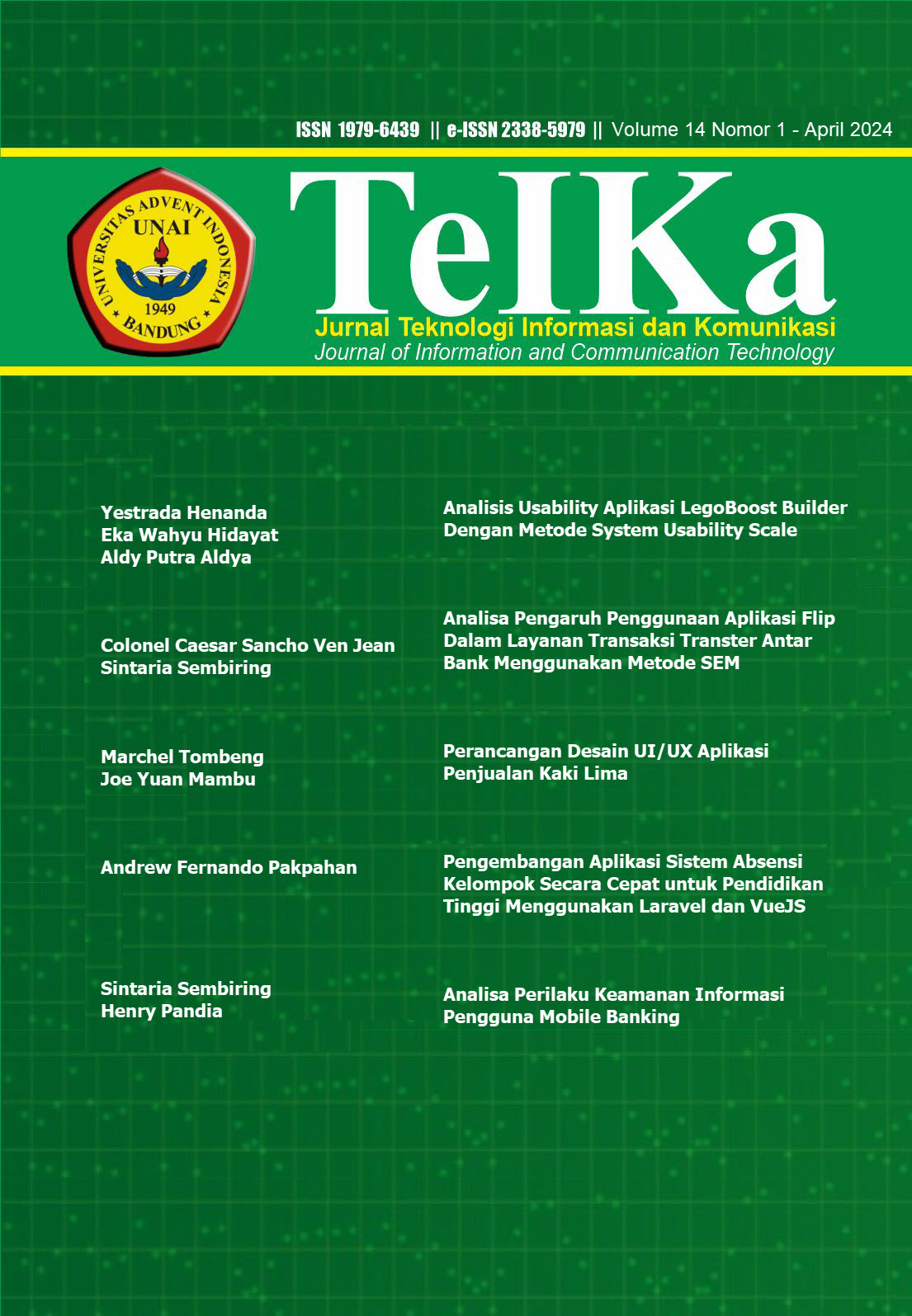Usability Analysis of the LegoBoost Builder Application Using the System Usability Scale Method
Keywords:
Usability, SUS, LegoBoost, Digitalization, EducationAbstract
The objective of this research is to evaluate and analyze the usability of the LegoBoost Builder application by employing the System Usability Scale (SUS) method. The LegoBoost Builder application is an in-house developed product by Lego Corporation, featuring animations of robot models that can be assembled using Lego kits. The application is intended for user as an interactive learning tool for animation and robotics. The selection of the System Usability Scale (SUS) method is considered an appropriate and significant evaluation approach to measure the usability of the application. Based on the conducted tests, the LegoBoost Builder application obtained an average of 70.52, categorizing it as GOOD with grade scale C. This score indicates that users find the application useful and beneficial in the educational context. In other words, the LegoBoost Builder application has fulfilled the needs and goals of users in supporting the learning process of animation and robotics.
Downloads
References
J. Smith, "The Impact of Technological Advancements on Education," Journal of Educational Technology, vol. 15, no. 3, pp. 123-135, 2019.
N. A. Widyasari, D. Ramdani, and I. Fitriyani, "The role of digital technology in enhancing learning motivation and achievement: A case study in Indonesian higher education," Journal of Information Systems Engineering and Business Intelligence, vol. 4, no. 1, pp. 18-28, 2018.
Direktorat Jenderal Pendidikan Dasar dan Menengah, "Pedoman Teknologi Informasi dan Komunikasi (TIK) dalam Pembelajaran," Jakarta: Kementerian Pendidikan dan Kebudayaan, 2018.
M. J. Koehler, P. Mishra, and W. Cain, "What is technological pedagogical content knowledge (TPACK)?" Journal of Education, vol. 193, no. 3, pp. 13-19, 2018.
Kementerian Pendidikan dan Kebudayaan, "Rencana Pembangunan Jangka Menengah Nasional Pendidikan 2020-2024," Jakarta: Kementerian Pendidikan dan Kebudayaan, 2020.
A. Rahman and A. Rizal, "Pemanfaatan Media Animasi dalam Pembelajaran Matematika pada Siswa Kelas V Sekolah Dasar," Jurnal Pendidikan Matematika, vol. 12, no. 1, pp. 57-66, 2018.
A. Suryanto, A. Pranoto, and A. Fitriani, "Pemanfaatan Robotik dalam Pembelajaran di Sekolah Dasar," Jurnal Teknologi Pembelajaran, vol. 8, no. 2, pp. 142-152, 2018.
A. Prasetyo, M. Rahayu, and I. Kurniawati, "Pemanfaatan Lego Boost dalam Pembelajaran Matematika di Sekolah Dasar," Jurnal Penelitian Pendidikan Dasar, vol. 4, no. 2, pp. 194-205, 2018.
F. Fatmawati, Y. Yusrizal, and A. M. Hasibuan, "Pengembangan Media Pembelajaran Berbasis Aplikasi Android untuk Meningkatkan Hasil Belajar IPS Siswa," Elem. Sch. J. PGSD FIP UNIMED, vol. 11, no. 2, pp. 134-143, 2021.
A. Suryani, M. Huda, and D. Iswanto, "Augmented Reality: Teknologi dan Aplikasi," Jurnal Nasional Teknik Elektro dan Teknologi Informasi, vol. 7, no. 3, pp. 243-250, 2018.
I. K. A. P. Triwardhani and Y. I. Rahayu, "Pemanfaatan Augmented Reality (AR) Sebagai Media Pembelajaran dalam Meningkatkan Motivasi dan Pemahaman Siswa," Jurnal Pendidikan Teknologi dan Kejuruan, vol. 25, no. 3, pp. 315-328, 2018.
A. Dhir and N. M. Gahwaji, "Impact of augmented reality on students' motivation, engagement, and learning achievements: A systematic literature review and meta-analysis," Educational Research Review, vol. 24, pp. 180-200, 2018.
L. Afriani and Y. Fitria, "Pengembangan Media Pembelajaran Berbasis Teknologi Berbantuan Adobe Flash Cs6 untuk Pembelajaran pada Masa Pandemi Covid-19," Edukatif J. Ilmu Pendidik., vol. 3, no. 4, pp. 2141-2148, 2021.
A. Mukminin, H. Husamah, Y. Riyanto, A. Habibi, and I. Ifdil, "Augmented reality as an innovative learning medium in Indonesian education: A systematic review of empirical studies," Journal of Educational Computing Research, vol. 56, no. 1, pp. 56-81, 2018.
Yi, M. Y., Jackson, J. D., Park, J. S., & Probst, J. C., "A meta-analysis of the technology acceptance model: Investigating subjective norm and moderator relationships," Information & Management, vol. 59, no. 3, pp. 103594, 2022.
Downloads
Published
How to Cite
Issue
Section
License
Copyright (c) 2024 TeIKa

This work is licensed under a Creative Commons Attribution-ShareAlike 4.0 International License.
The submitting author warrants that the submission is original and that she/he is the author of the submission together with the named co-authors; to the extend the submission incorporates text passages, figures, data or other material from the work of others, the submitting author has obtained any necessary permission.
Articles in this journal are published under the Creative Commons Share Alike Attribution Licence (CC-BY-SA What does this mean?). This is to get more legal certainty about what readers can do with published articles, and thus a wider dissemination and archiving, which in turn makes publishing with this journal more valuable for you, the authors.
By submitting an article the author grants to this journal the non-exclusive right to publish it. The author retains the copyright and the publishing rights for his article without any restrictions.










